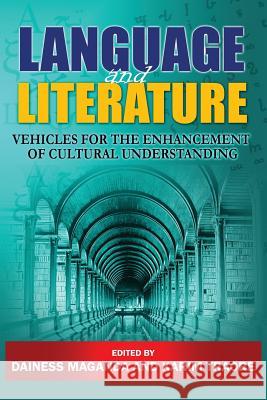Language and Literature: Vehicles for the Enhancement of Cultural Understanding » książka
Language and Literature: Vehicles for the Enhancement of Cultural Understanding
ISBN-13: 9781909112582 / Angielski / Miękka / 2016 / 290 str.
As the world continues to interconnect, in this modern age, the need for people to understand one another is magnified. Whether for business purposes, entertainment, tourism or any other reason, the more people learn about the world and the cultures that define them, the more they are able to make this world a better place. The languages people speak reflect the lives lived. Understanding people's cultures therefore necessitates the use of language. This book underscores the importance of using language and literature to enhance cultural understanding. It also discusses the ways in which the teaching of African languages and literature can be used as vehicles for developing people's understanding of African cultures. _____________________________ Dr. Dainess Maganda is the Director of the African Languages Program at the University of Georgia, USA. She is also the Coordinator of the African Studies Certificate program and also teaches Swahili language and culture in the Comparative Literature Department. Her publications center on language ideologies and on pathways to promote the use of African languages in schools in the US and internationally. Some of her recent books include: The Scarcity of Literature Written in African Languages in American Libraries (2015) and a co-authored book: The Swahili People and Their Language: A Teaching Handbook (2014). Dr. Maganda is also a poet focusing especially on fostering the value and place of people's identity. Dr. Karim TraorE is an Associate Professor of Comparative Literature and African Studies at the University of Georgia, USA. His research centers on literary anthropology and indigenous aesthetics in African literatures and films. His books include Le jeu et le sErieux: essaid'anthropologielittEraire (2000)"Fun and Ernst: Essay of Literary Anthropology on the Epic Poetry of the Mande Hunters' Bard (West Africa)and Die Verlobte des Marabut (1999)"The Marabut's FiancEe.."
As the world continues to interconnect, in this modern age, the need for people to understand one another is magnified. Whether for business purposes, entertainment, tourism or any other reason, the more people learn about the world and the cultures that define them, the more they are able to make this world a better place. The languages people speak reflect the lives lived. Understanding people’s cultures therefore necessitates the use of language.This book underscores the importance of using language and literature to enhance cultural understanding. It also discusses the ways in which the teaching of African languages and literature can be used as vehicles for developing people’s understanding of African cultures.











